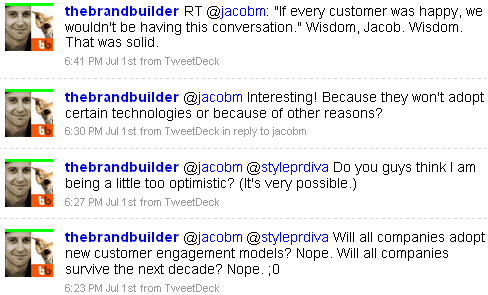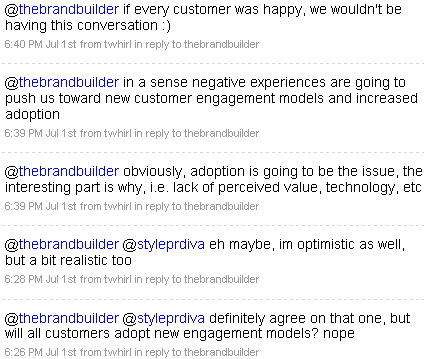I’m going to make a bold statement which is in essence in the title of this post, if it weren’t for negative experiences and feedback then new customer engagement models would NOT exist (or perhaps would take MUCH longer to adopt). So what does this mean? It means that the organizations that you see joining the social media space are doing so because they are getting trashed online. I actually had an interesting discussion with Olivier Blanchard on Twitter which went a bit like this:


If you are unhappy about your internet connection, your flight, your computer, a place you ate at or any product you purchased or service you received, what do you do? Tweet about it, blog about it, go on yelp, etc. This is why most of the companies are getting involved in social media, because of negative customer experiences and feedback that FORCE them to get online. If Dell Hell didn’t happen do you think they would have adopted such a leadership role in social media? Absolutely not. If people weren’t always complaining about Comcast’s service on twitter do you think they would be on there? No. This is the process that we are taking with new customer engagement models. I’m not David Armano with the graphics, but hopefully you can get the points from this (and if you want to create a better graphic I’d be happy to post/share it):

If customers were happy then we would not see companies on social media, why? Because there would be nothing to force them on. Am I saying that we would Never see companies in the social media space? No. I’m saying that we wouldn’t see much activity or much of a presence from any of them.
Your thoughts on this?

Bang on Jacob. Why can't companies be proactive rather than reactive and head off any negative experiences before the customer takes them online?
I was following your tweets about your Dell computer woes. You probably wanted to throw your computer against the wall, but once you regained your composure and called Dell, it didn't help that Dell employees responded to your hellish experience with “that's impossible” or couldn't solve your problem, Well it was possible and your computer did crash right before your eyes.
Companies should take a hard look at their offline customer relations department – usually the ones hearing the customer's wrath – and ensure that they are putting the right people on the front lines. Sh*t happens and people are forgiving but it's when you get employees who discount your complaints or respond in unhelpful ways that push comes to shove and we're taking our complaints online and now a company needs to get involved in social media so that the negative comments don't continue to be proliferated online?
So many companies are reluctant to adopt social media because they don't know enough about it and are afraid of what will be said about them online. Well we all know that we'll say the bad (and the good) whether they're online or not. So companies may as well join the conversation, promote whatever good stuff they want to promote and oh ya, respond to negative customer experiences before they proliferate.
Connie Chan
Mighty Mouth Media
@connieincalgary
Well put.
The next step in the evolution of customer service and commerce is Social Media. Consumerism has changed. Buyers are looking for transparency from companies they purchase from.
It takes time and effort it to successfully use Social Media. The payoff is well worth it. Companies, think of it this way… using Social Media takes you to the streets. You have the opportunity get to know your consumers on a personal level; what they want, what they're doing, where they are. Essentially, Market Research. Why wouldn't you use it?
Thanks for the article Jacob.
Shauna McConechy
Out Enterprises Inc.
I don't think it's limited to social media, Jacob. Yep, we definitely have a more vocal method of airing grievances (and, I would hope, positive experiences too). Yet business practice was changing long before social media found such popularity. Consumer groups, consumer magazines and media stations were offering a way for the average person to air issues to companies. This led to best practices being implemented offline (customer focus groups, advanced customer service, website and retailer/restaurant feedback forms, etc) with companies that wanted to improve and listen to their customer base.
I agree that businesses seem to be taking up the sack more now that Twitter, blogging, forums and other outlets have shown that our voices are being heard and that companies need to be there to hear what's being said, and react. I just feel that social media is just another avenue for what's already been happening for a few years now, at least for those that want to make changes to how they perform.
A bit of a counter-point, Jacob (though I agree with much of the argument): Some of the most successful companies in customer service got on social media BEFORE they had a customer melt-down in the space (like Southwest Airlines).
I think what you've noted was the catalyst for companies to learn what social media were back when the concept was new and foreign; I think at this point, some companies (though far from a majority), have begun to join social media for new ways to build a brand and less for customer service.
Another example is Nike. Their engagement in social media seems to be much less about customer service/satisfaction (though I'm sure they handle complaints that they come up against in the space) than it has to do with championing the community which may have already existed around their products/mission. Dell Hell most certainly opened corporate eyes to the existence but now they've been shown the power of a living community and see revenue potential in that.
Hi Nicole,
To be honest I'm actually not sure when Southwest joined the social media space but im sure if we look back that there was something negative that made them join. Or, they were looking at the competition and decided to get to social media before the negative feedback began. the thing is that if everyone is singing praises about your product then you probably dont need to be in the social media space. if the world were a happy place then social media would be MUCH quieter.
great point though and thanks for the comment
nope it's not just limited to social media and yes social media is just another avenue, however social media became another avenue the second someone went onto a social network and said “i hate…”
thanks for stopping by shauna!
Sorry fella, have to disagree with one small point you make in reply to Nicole:
“the thing is that if everyone is singing praises about your product then you probably don't need to be in the social media space.”
That implies that the only people using social media are those that are looking to deflect negative publicity about themselves. It doesn't allow it to be a connection tool, or conversation tool, or promotional tool, or focus group tool, or anything else you might associate with it.
For sure, it's one of the most effective means of deflecting negativity and facing it head-on, but I'd disagree that it's only for negative reasons that brands are using it (unless I've misread your response). 🙂
im probably should have worded that better, from a corporate standpoint the attitude is that if nobody is saying anything bad about us, then we don't need to be there. if it werent for negative feedback we would not see anywhere near the level of corporate involvement that we do today.
It's a fair point. Not sure if I completely agree with it, but definitely can see where you're coming from 🙂
its ok, i still love you 🙂
i added this to my collge report
regards
marshel
______________________________________________
aion gold | Cheap Aion kinah
I would agree with you. Infact while the consumer has gone way ahead without 'formulating any strategy' unfortunately the MOST folks are still 'discussing strategy' instead of going ahead. AND again unfortunately when folks do proceed, what they come out is with 'dealing with an issue' RATHER than 'cultivating a community'
I would agree with you. Infact while the consumer has gone way ahead without 'formulating any strategy' unfortunately the MOST folks are still 'discussing strategy' instead of going ahead. AND again unfortunately when folks do proceed, what they come out is with 'dealing with an issue' RATHER than 'cultivating a community'